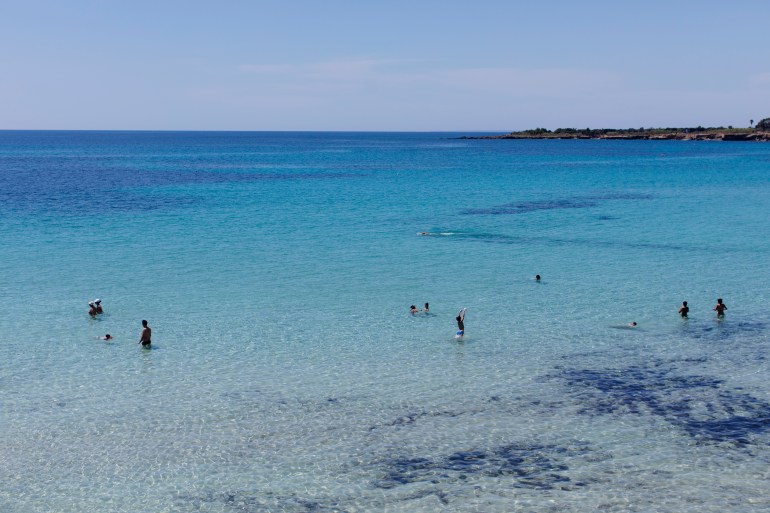A European odyssey: A portrait of Europe during the pandemic
Two journalists travelled from the North Cape to Sicily to document a Europe divided by the coronavirus crisis.
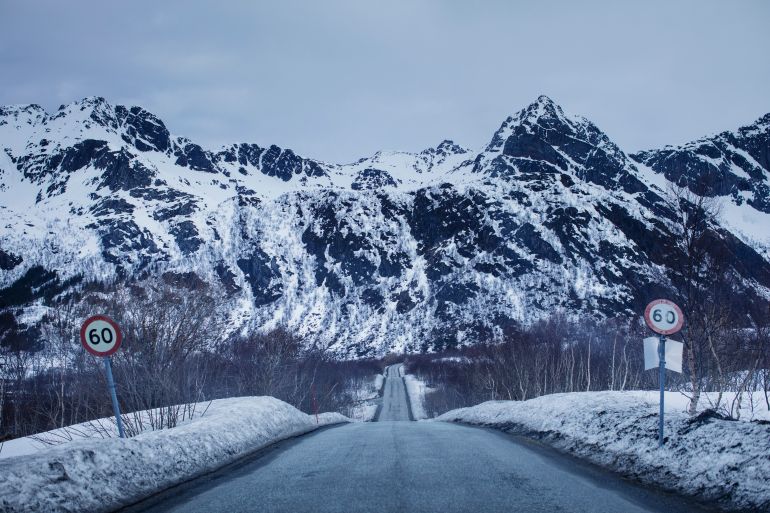
Listen to this story:
The main road leading to the Sicilian town of Cassibile is flanked by derelict houses. In days gone by, these stood as elegant mansions with arched entrances and large windows, but during the second world war, they were shot to pieces, never to be restored.
Keep reading
list of 4 itemsMexico’s teachers seek relief from pandemic-era spike in school robberies
‘A bad chapter’: Tracing the origins of Ecuador’s rise in gang violence
Why is the US economy so resilient?
The ruins gape at us, overgrown by stinging nettles and littered with plastic bottles. Through the rubbish, we can see the village of makeshift tents, home to about 300 refugees and migrants.
“Do you speak Norwegian?” A Somali man walks towards us, smiling.
He arrived in Norway as a refugee when he was a minor, he explains. He learned the language, played on the local football team and worked off the books for cash in hand at a restaurant in Oslo. But after his third application for settlement was denied, his lawyer advised him to apply again from Italy. He is optimistic now, he says, and does not want to do anything to jinx his chances. He is engaged to a woman back in Norway and is just waiting for the borders to reopen. That is why he does not want to give us his real name, he explains.
A Gambian man appears as if from nowhere. He looks weary and wary. “It’s a jungle out here,” he tells us. “You have to be strong and make do on your own, because there are no brothers here, only a jungle,” he adds, disappearing again before we have a chance to ask his name.
Six weeks earlier, a month and a half after large parts of Europe had gone into lockdown, myself – a theatre critic with no opening night invitations – and Kyrre Lien – a photojournalist with no commissions – decided to travel from the northernmost fishing village in the world to the southern tip of Sicily. We wanted to find out what remained of the Europe we once took for granted.
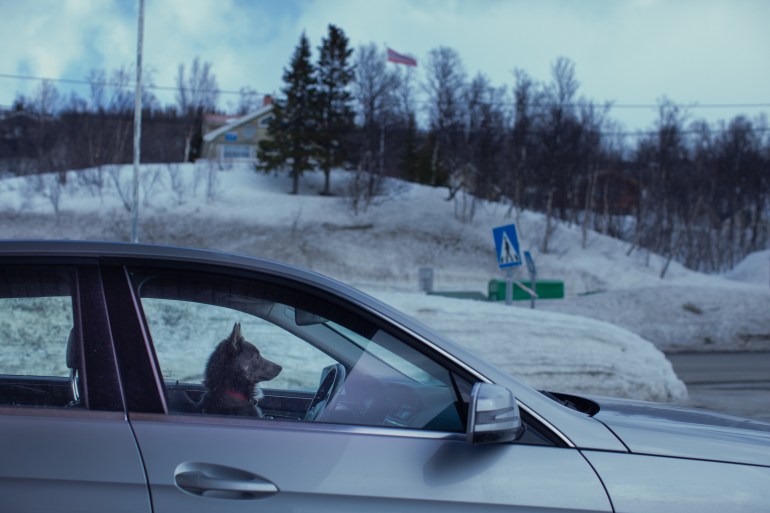
Our journey began at the airport in Alta, 70 degrees north – the closest point to North Cape – to which you can get a direct flight from Oslo.
“I’ve had corona [coronavirus],” the car rental rep informs us. “Caught it when I slept with a Finnish tourist.”
“I thought the Finns had stopped coming,” I say.
“Certainly have,” says the man. “She was one of the last who came before the border closed.”
In the same week that Norway closed its borders, bringing in Home Guard soldiers to patrol them, several local councils started to make up their own rules. In Nordkapp and Alta, for example, anyone arriving from other regions was put into a 14-day quarantine.
The mayors said it was to protect citizens, but the national government argued that they had no mandate to create their own infection control borders. Two minutes before our plane touched down in Alta, the local council repealed the so-called “Southerner quarantine”.
“I’ve upgraded your car,” says the rep. “You have a long way to go.”
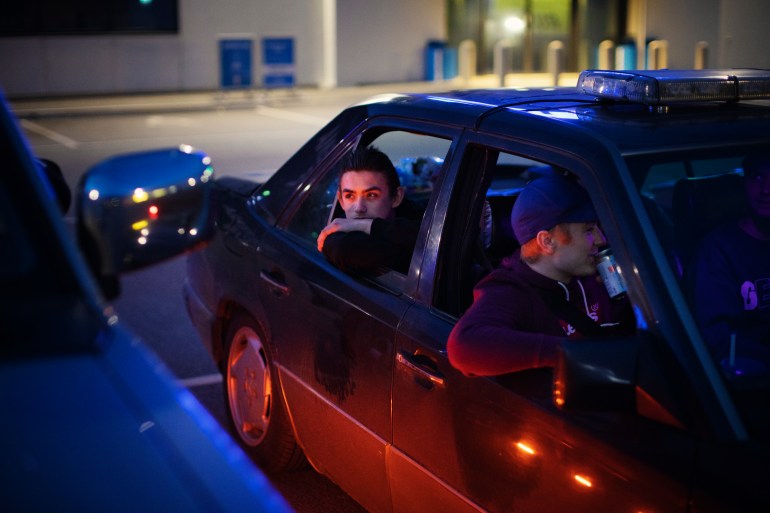
It is hard to predict what kind of Europe we will encounter. In the spring of 2020, the continent had excess mortality of 160,000, yet it almost feels like we have all been hit separately. In some countries, Europeans took to the streets to protest against infection control measures.
In other places, people put their faith in the authorities despite high mortality rates and few infection control measures. This division does not just span borders, it has gone right into people’s homes. Some argue that the coronavirus is “the biggest con in the world”. Others believe this crisis will change our way of life forever.
It is a three-hour drive from Alta to the fishing village of Skarsvag. In the winter, part of the road was closed several times a week because there was too much snow, making it impossible for tourists to get in and for the 40 inhabitants to get out.
Then a few months later, the coronavirus came. Skarsvag, which previously saw a regular stream of coaches with Chinese, Italian and Russian tourists, suddenly became one of the world’s most isolated villages.
Since 1999, Heidi Ingebrigtsen has run the village’s main attraction, Julehuset (The Christmas House), a small, red cafe that sells hand-knitted Santa Clauses all year round.
“I could make some waffles, but perhaps you’d rather have some cream cake?” she says. Heidi and her husband Kjell take their seats a few metres apart from us in the locked-down Christmas cafe. It smells of coffee, yarn and cream cakes.
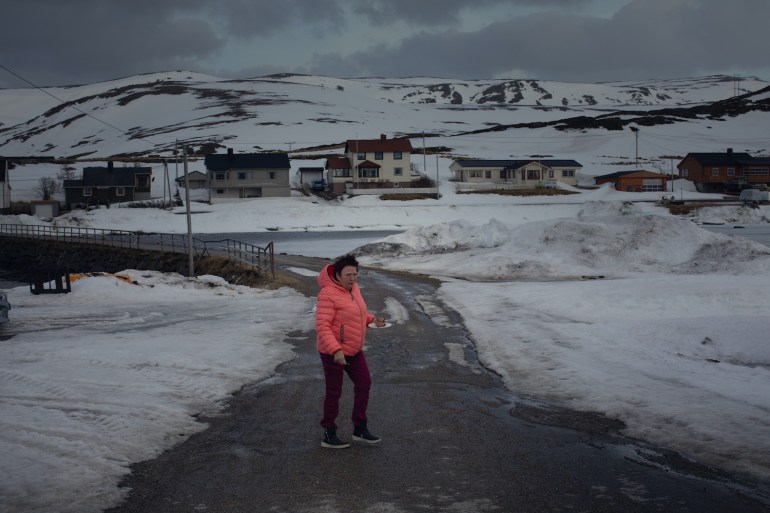
Skarsvag subsists on fishing and tourism, and Kjell Ingebrigtsen switched from the first industry to the second. He single-handedly built three holiday homes – replete with saunas, filleting rooms, freezers and sea views – and in the first three seasons holidaymakers arrived from all over the world. A wealthy young Thai man was so taken with the experience that he stayed through Christmas, having cycled all the way from Bangkok.
A famous graffiti artist ended up decorating Kjell’s truck. Fishing enthusiasts from Lithuania, Ukrainians eager to learn filleting and Norwegian multimillionaires booked the holiday homes, all of them more than welcome, until suddenly they were regarded as a threat to the health of the villagers.
Kjell has undergone heart surgery twice and, as such, is classified as high-risk should he catch coronavirus. He faced a dilemma; what matters most, the income from tourism or the danger posed by the virus?
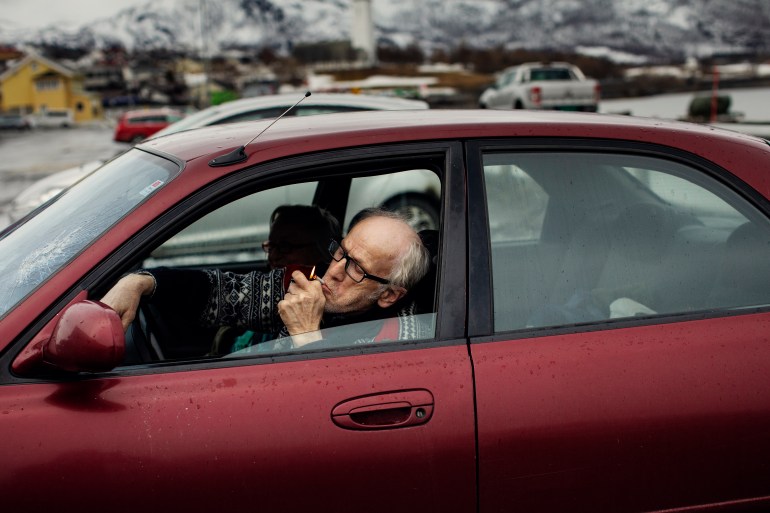
He offers us a discount on one of the holiday homes, but Kyrre and I have already decided to sleep in our tent wherever possible. It is a way of decreasing the risk of contagion, Kyrre says, and it also helps us to travel on a shoestring. I argue that this may not be the most appropriate night to spend in a tent – with the ground being covered in two metres of snow – but Kyrre does not give in.
He is not the type of person who books into a hotel, he says. Nor does he need a flushing toilet, as he maintains a spade is by far the best solution. “But we’ll need a shower,” I insist. Kyrre groans, dismayed that a stickler for hygiene should embark on a journey across a continent facing its biggest crisis since the second world war. “You’re working, you can’t obsess about your personal hygiene,” he exclaims.
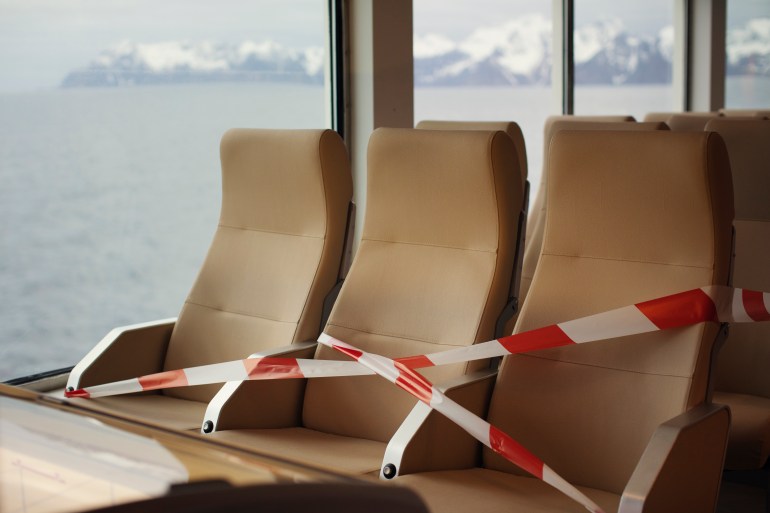
I know that wherever I go with Kyrre, anything can happen. Maybe that is why I have been following him like a shadow for eight years now on increasingly audacious projects, like some kind of Sancho Panza of journalism.
“I left the door to Cape Marina unlocked,” says Kjell. “In case you change your minds.”
“Appreciate the offer, but it’s unlikely,” Kyrre replies. “We’ll sleep in the tent.”
The gales grow stronger as the night wears on. It is like the wind is holding its own talk show outside the tent. I could have endured the wind if it had not been for the cold. I stretch. I curl into a ball. I look at my watch and tell myself that everything in life is a matter of time. Cold will turn to warmth, viruses will subside and even nights of gales in the extreme north of our planet will eventually dissipate.
Sweden
As we drive to Sweden, we read news articles about no-social-distancing parties in this outlier country, where state epidemiologist Anders Tegnell has acquired such cult status that someone has had his face tattooed onto their bicep. Unlike other European countries, Sweden maintained its faith in herd immunity for a prolonged period of time, but by early May doubts were being raised about its effectiveness.
The border crossing speaks for itself: On the Norwegian side, police officers in high-visibility jackets stop every car, while anyone can drive into Sweden, no questions asked.
“My aunt Ashilld has invited us for breakfast in Helsingborg. She’s meeting up with four friends in a park,” says Kyrre as I am woken by the sun beating down on our tent. We have spent the night on the beach in Falkenberg, in an effort to avoid exposure at campsites.
“Achoo … ” I reply, diving out of the tent. I pace around in circles for a moment, as I often do whenever I succumb to the allergy-induced sneezing fits I have had since I was a baby. More than 90 minutes later, when we arrive at our destination in Helsingborg, I am still sneezing and Kyrre worries his aunt’s friends may pack up their picnic bags and leave out of sheer virus anxiety. But they do not.
I try to detect scared glances from passersby, but none meet my gaze. This is an open-minded country, I say to myself, a nation where fear has not gripped everyone, despite the fact that 81 people died from COVID-19 in the last 24 hours alone.
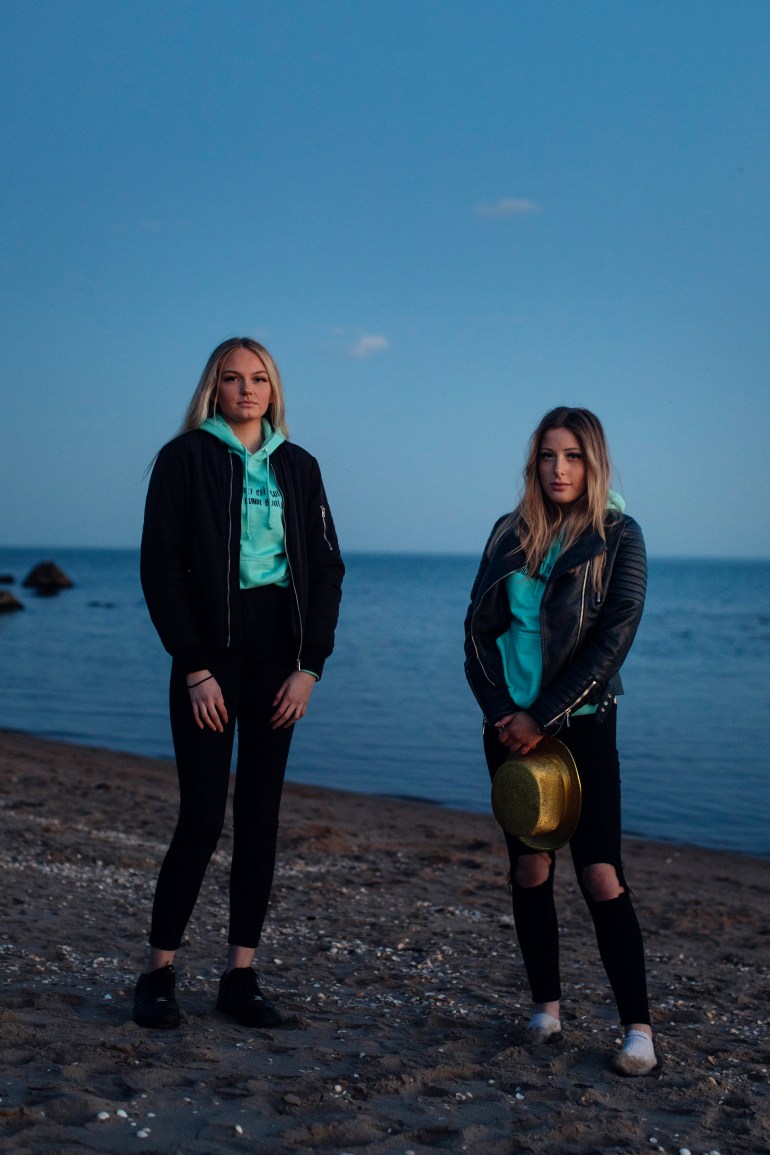
As in most groups of friends, the women have approached the coronavirus crisis differently. Annette Colin says she went into almost complete isolation and would not let Ashilld Henriksen, who plays in a symphony orchestra and meets lots of people, cross her threshold when she turned up with a cake.
For a while, Annette kept her daughter home from school and had to contain a growing sense of anger at the authorities. “However … I came around to thinking that perhaps their strategy isn’t that stupid after all,” she says. “Now I don’t think it is right to force people into lockdown, and that it’s better to enforce the use of disposable gloves and anti-bacterial handwashes in places where people socialise.”
The friends discuss the parcels they have sent to their grown-up children and their visits to fragile parents in nursing homes. When Annika Lindstrom visits her mother, who suffers from dementia, she sees her through a plexiglas screen, supervised by nurses wearing visors. “She hasn’t missed me, but I miss her. I miss holding my mother’s hand,” she says.
Denmark – Germany – Switzerland
We cross the border to Denmark that afternoon. In a roadside cafe, we tuck into frikadeller, Danish flat meatballs. The outdoor area has been cordoned off, as if a murder had just been committed there. Only a few benches facing the parking lot are available for customers to eat at. Some elderly women blow cigarette smoke in our direction. “You have to eat faster,” Kyrre says. “We have to get to Cologne.”
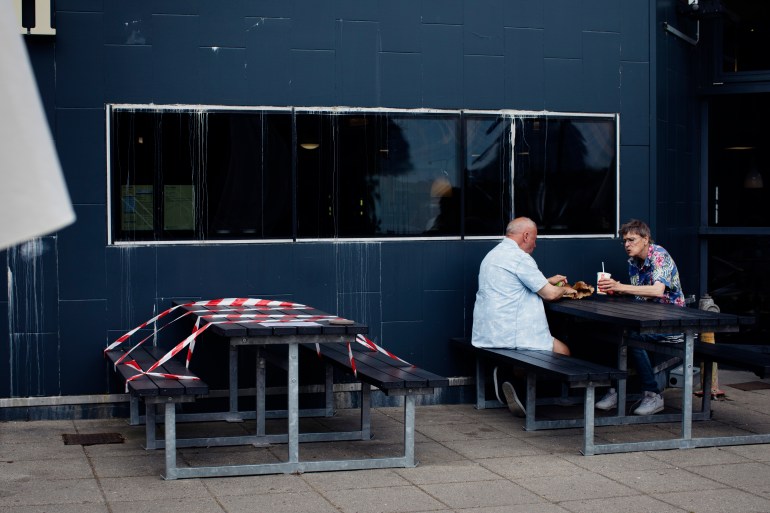
A week earlier, a human chain was formed in protest against the lockdown in the German city. Only 250 people turned up, but in other German cities, the demonstrations drew far bigger crowds. In Stuttgart, about 5,000 took to the streets, in Berlin more than 1,000.
The participants – far-right extremists, anarchists and anti-vaccination activists – crossed traditional political divides. The coronavirus crisis has spawned new movements, opposed to lockdown measures and restrictions and headed by social media personalities who claim that the mainstream media are lying. All over Europe, conspiracy theories have spread so fast they have given the virus a run for its money.
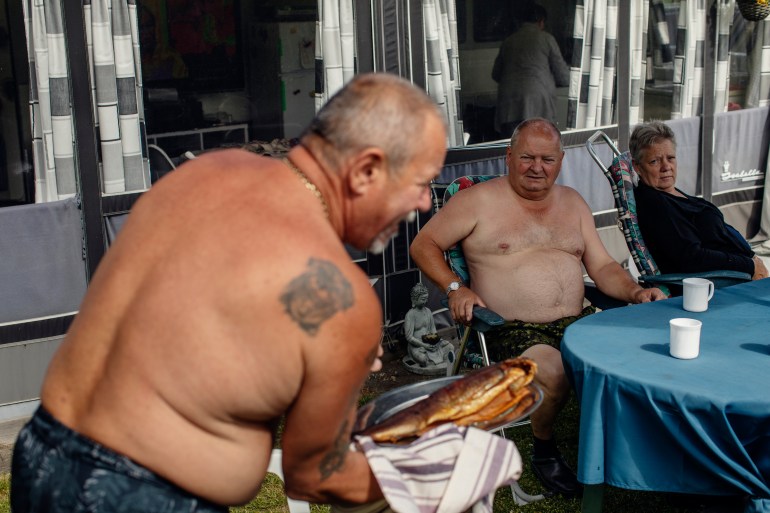
Outside a run-down bar in Campione d’Italia, an Italian enclave in the heart of Switzerland, we meet an American couple who claim they have had enough. “This is the biggest con in history,” shouts the man. “I’m a biologist myself, and I’ve never seen anything like it.”
They had been intending to travel on to Malaysia, where they planned to enrol their 10-year-old son in a private school, but then the borders closed and, not wanting to return to the US, they found themselves stuck in Campione.
“Viruses spread so fast that if this had been real, you’d have been dead already,” the woman insists.
The couple are convinced that pharmaceutical companies are behind all this, for a simple reason: “In this way, they can profit on the health anxieties of the entire world.”
“What about the dead?” asks Kyrre. The woman shrieks. “They died from other causes, and then the doctors say it was the coronavirus.” Her husband nods. “I know lots of doctors, and none of them dare to tell the truth. The coronavirus is a con.”
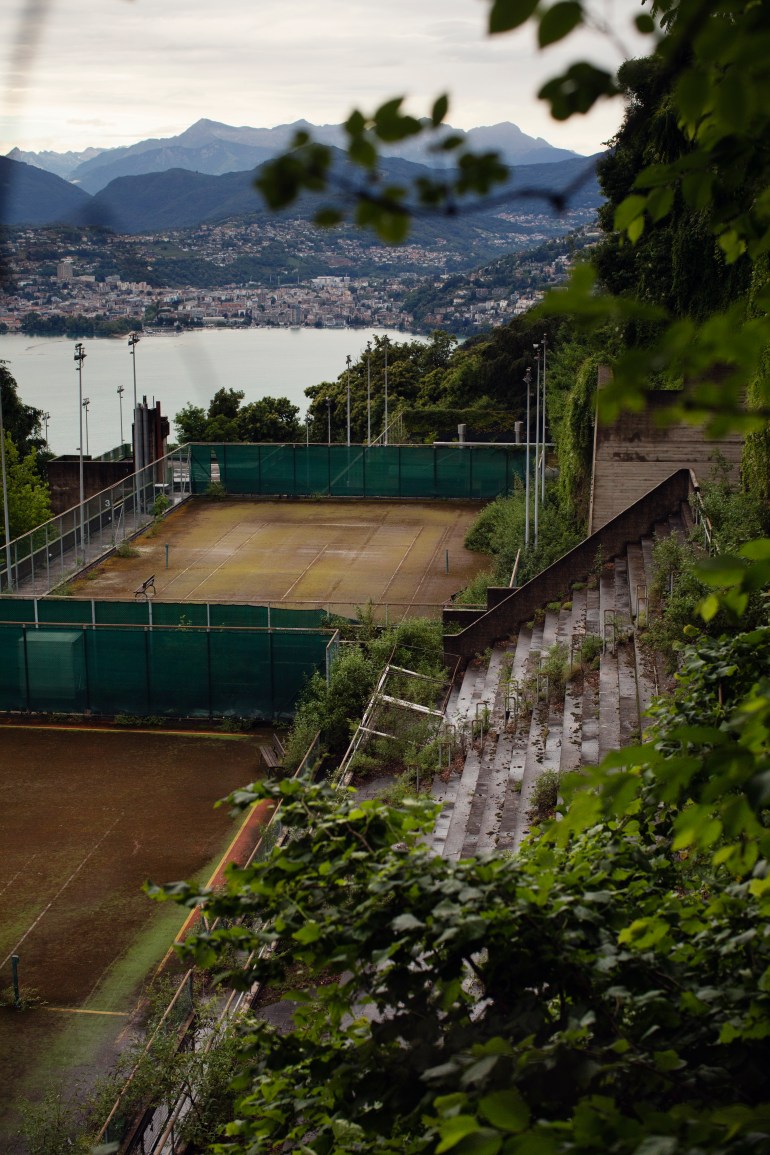
Further up in the hills of Campione, a Russian woman called Galina is out with her dog. It is raining so heavily that she has taken shelter in a garage adjacent to the park.
“It’s the face masks that kill,” she tells us. “People inhale dangerous gases and drop like flies. The coronavirus is a lie. The media won’t write about it, but I can read it online. And think for myself.”
She looks at us in anticipation, as if she has just given us some groundbreaking news, something we have never heard before. But we have, because these stories take on a momentum of their own, across national borders and political perspectives. In the current climate, conspiracy theories appear more unifying than any customs union.
In Campione d’Italia, Russians, Americans and Italians have found an exclusive haven in the heart of Switzerland. Two days earlier, however, we had visited another international micro society: the primaeval Hambach Forest outside Cologne.
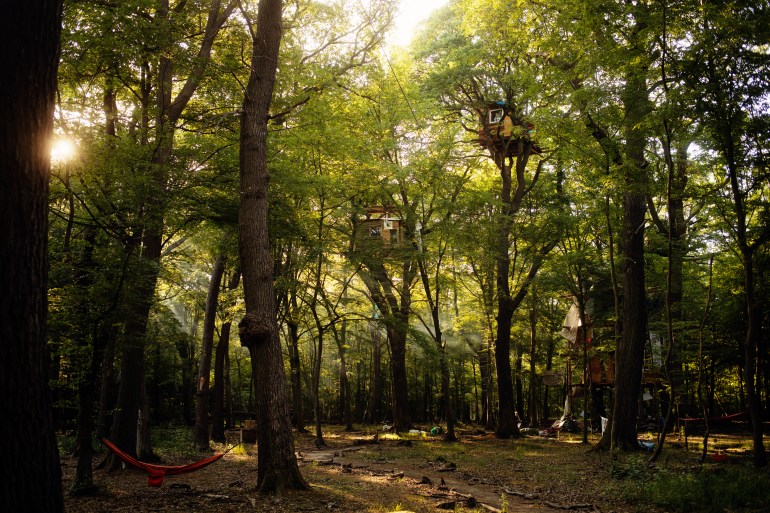
For eight years, it has been occupied by anarchists, after one of Germany’s largest coal mining companies cleared parts of the ancient forest to open a mine. The anarchists built houses in the tops of the remaining trees and founded a new society with inhabitants from all over the world.
Aware that the police could raid the forest at any moment, they had set up roadblocks and built watchtowers. Here, they took it in turns to keep guard, they learned to climb from tree to tree, took on aliases and developed strategies for the day when the police might come to demolish their camp.
One day in September 2018, that is exactly what happened. Police stormed the forest and chopped down 50 of the trees with houses in them. The police operation went on for days, and did not end until a journalist who had been living in the forest and making a documentary about the activists fell out of a tree and died.
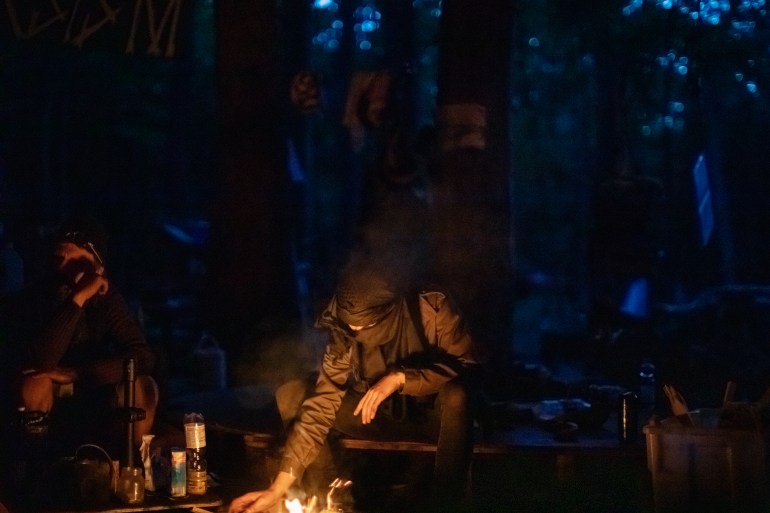
Eighteen months later, politicians in the state of Nordrhein-Westfalen did a U-turn: the forest would be left standing. However, the activists kept occupying it, and felt little sense of joy or relief at the decision.
“Previously we had a goal, but suddenly we had nothing left to fight for,” says our companion in the forest, a luthier in his 40s. He calls himself Nemo, after the captain in Jules Vernes’ book, Twenty Thousand Leagues Under the Sea.
Nemo tells us that they were traumatised after the raid on the forest and that the political turnaround only provoked them. “We know that the forest won’t survive anyway, because the excavations have gone too far. The trees will rot on their roots.”
It is seven in the morning, but Nemo has not slept. He has been keeping watch by the camp, as he is afraid other occupants will steal, or to put it in his words: “It is interesting to see what is going on when people think you are sleeping.”
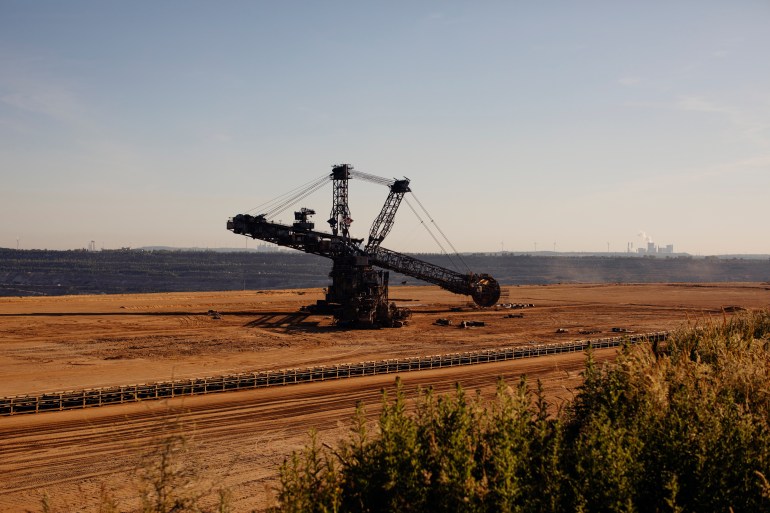
The coronavirus crisis has also divided the group. Some think the anti-lockdown demonstrations in Cologne were carried out by far-right extremists who must be fought; others believe the restrictions are an attack on people’s freedoms.
Nemo says he changed his view of the world when he started reading alternative media. In the end, he decided that he could not participate in mainstream society any longer and moved into the forest two years ago. He sees similarities with the way the coronavirus crisis has played out.
“People who have a different opinion than the authorities are called conspiracy theorists or extreme right-wing populists, while the mainstream media and politicians clamp down on anyone harbouring an alternate view,” he says, adding: “More than 20,000 people die from flu every year. We never read that in the papers.”
“Do you believe in the conspiracy theories?” I ask Nemo.
He hesitates. “I think the truth lies somewhere in between,” he concludes.
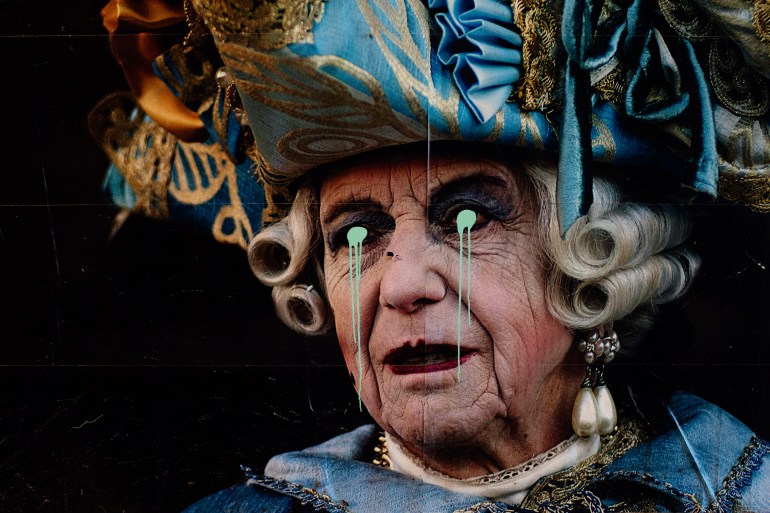
France
It is all in the Bible or the Quran, just look it up, we are repeatedly told by believers we meet on our journey from the North Cape to Sicily. There will be more bad years to come, they add, but as long as you keep the faith, you will be alright.
We drive to an evangelical superchurch in Mulhouse, a French city close to the borders with Germany and Switzerland, to which a cluster of 2,500 cases was traced following a service in February. Seventeen of the infected people reportedly died. The church started to receive threats, and is now surrounded by high fences and surveillance cameras.
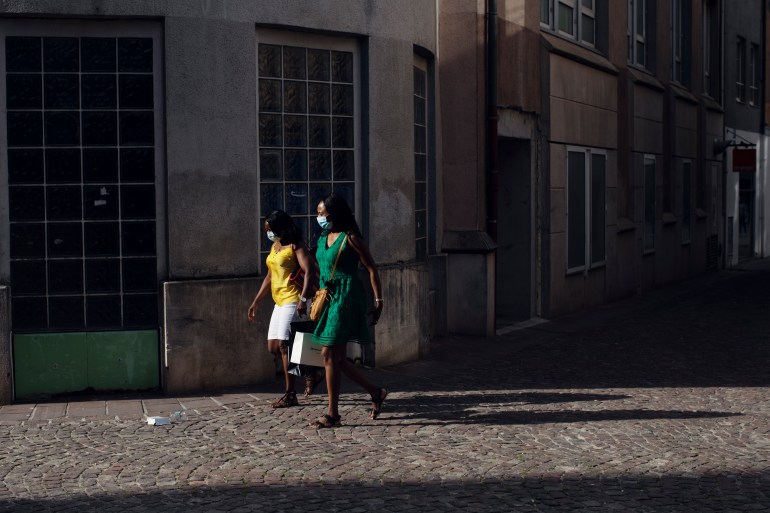
At a nearby park, we meet one of the churchgoers. Moses Esombi is originally from South Africa, but moved to France after getting caught up in gang violence. “In South Africa, you always watch your back,” he says.
Christian Open Door Church was his favourite church. He liked the atmosphere there, and the preaching, he says. But then his friends and family started to cough.
“My mentor, I call him uncle, got really ill. It was hard to find a hospital that would take him in. I don’t know why it was so hard,” Esombi reflects.
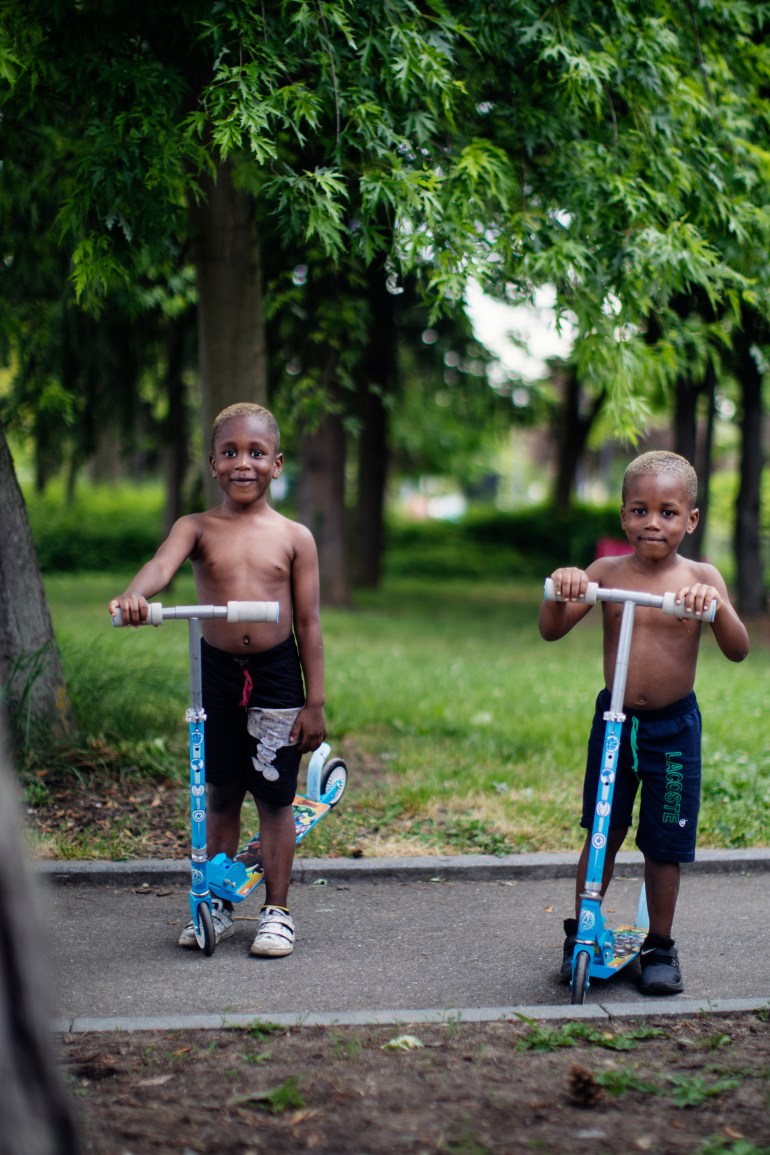
I have read neither the Bible nor the Quran, but I have read Albert Camus’s 1947 novel The Plague, in which he describes an outbreak of the plague in the Algerian town of Oran. In the second part of the book, Father Paneloux holds a sermon during the epidemic: “The hour has struck for taking thought. You fondly imagine it was enough to visit God on Sundays, and thus you make free of your weekdays. You believed some brief formalities, some bendings of the knee would recompense Him well enough for your criminal indifference. But God is not mocked.”
During our journey, we hear similar speeches. In Kristiansand, at the southern tip of Norway, we attend a digital service of an independent church. The preacher says that God is like a king; he is seen as symbolic, but has in fact got the power to be something more. It is up to the individual to make God the head of government, he says, not just someone to seek during the good times. When we ask the preacher if the coronavirus is the will of God, he replies: “God knows what’s happening.”
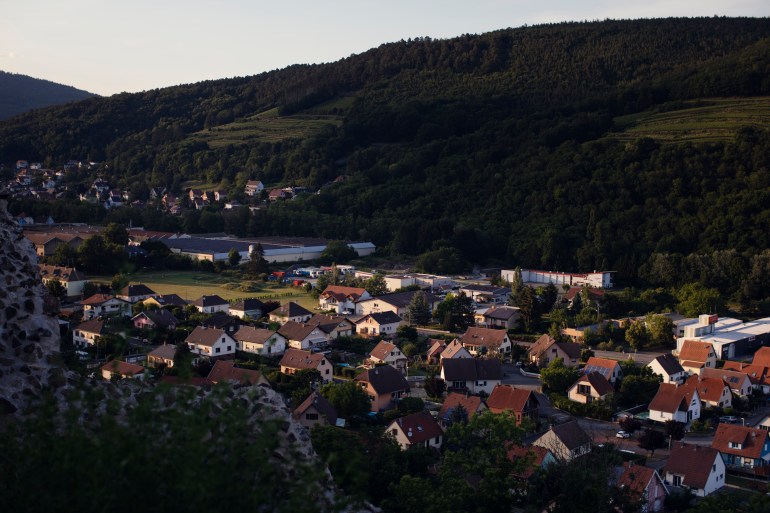
Italy
We spend our first night in Italy on the grounds of a monastery. I had tried to find a cheap campsite close to the Swiss border, and La Famiglia appeared to be one of few that was still open.
In the darkness, we glimpse caravans parked up for the winter. There is nothing more lonely than a garden full of empty caravans, I think, as rain batters my face. In the distance, I see an umbrella. I assume it is a nun. “You can sleep in the party tent,” she says, pointing at a covered square.
“It’s raining so heavily that I wouldn’t recommend you put up your tent on the grass.”
She clears her throat and takes out a forehead thermometer, which in the dark resembles a futuristic gun. “32.4,” she reads. Her eyes are smiling. “If that was right, you would have been dead already.”
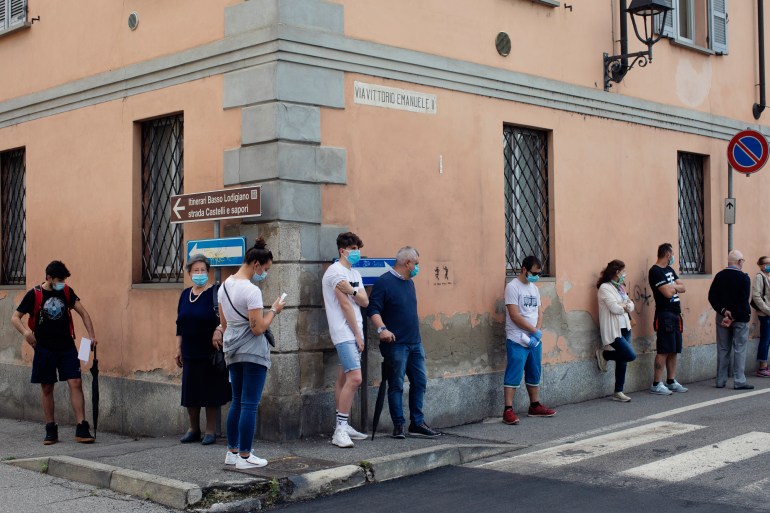
The next morning, we get her name, Rosella Bertoglio, and it turns out that she is not a nun after all, but a teacher. After her husband died from a genetic disease, she moved to the monastery with her daughters. Now her daughters have grown up, and she has retired, but she says: “The monastery is like my family, and I want to live with my family.”
Every morning the residents of La Famiglia attend a service in the local church in Malnate, before live-streaming two prayer meetings from the monastery. “We pray for the sick and those who have died,” Rosella says.
During the past three months, about 60 people have died from COVID-19 in the small village, according to the monastery.
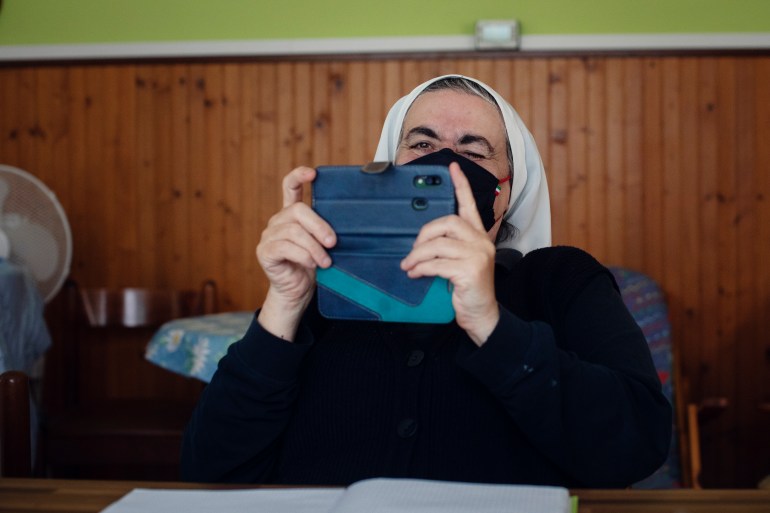
There are three women living in the monastery, which used to be a wealthy family’s mansion, but only one of them is a nun. She has been here since 1984. She serves us espressos accompanied by a bag of M&Ms.
“You could read the Bible from cover to cover without finding any answers at all. Maybe you don’t know how to read, what to look for,” Rosella tells us in broken English.
I ask if she has found any answers.
She laughs – a warm, drawn-out giggle. Then she suddenly turns serious. “In the Bible, you can find everything that happens in people’s lives,” she says.
When we move on to Pisa, Kyrre agrees to stay in a hotel for a night, as long as he can choose which one.
From inside the Royal Victoria Hotel, we hear the sounds of the street: high heels on cobblestones, subdued giggles, students rushing past. The Royal Victoria Hotel has survived two world wars and an unknown number of financial crises. The American aviator Charles Lindbergh stayed here between flights, as did the Norwegian explorer Roald Amundsen between expeditions. Other notable guests have included Benito Mussolini, Charles Dickens, Theodore Roosevelt and Alexandre Dumas. They may not have had much else in common, but they all passed through the Art Nouveau doors, ascended the creaky stairs and booked into airy rooms with a view of the old town.
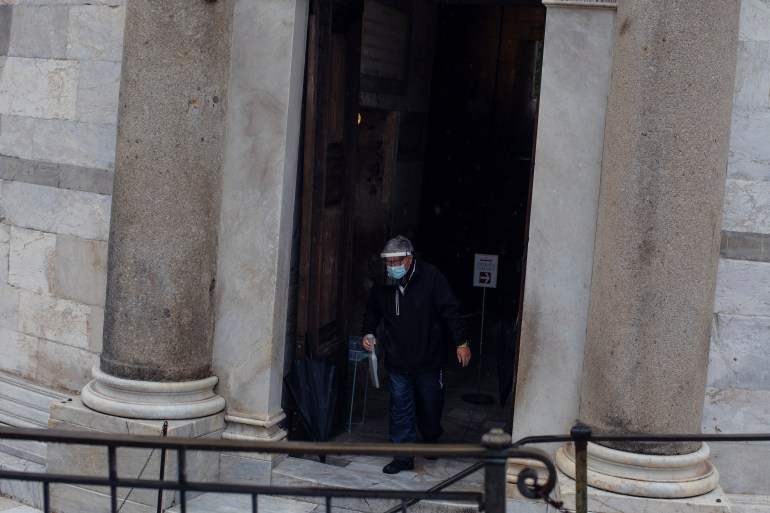
At the beginning of the coronavirus crisis, the rooms stood empty, but then the locals started moving in. “This was the only place you could get an espresso,” Eugenia Chauvie, the receptionist, explains. “You had to book a room first, but we dropped the prices. For a while, we only charged 30 euros a night.”
The Royal Victoria Hotel turned into the house of the lonely, those who did not want to sit isolated in their flats. “Loneliness is ugly,” Eugenia reflects as she tells us her story in the dark, empty reception.
“They just wanted someone to talk to,” she says of the Italians who called to cancel their reservations. “They talked and talked, because when Italians are scared, they talk even more than usual.”
For a long time, she was the only one on duty, and she did everything herself: maintenance work, making the beds, cooking breakfast, serving the hotel owner, attending the reception desk – and listening to those who wanted to talk. She was hired two days before the lockdown began, and had to keep the hotel running as other staff were furloughed.
At first, she was happy to have a job to go to, but then she started thinking: “This could be dangerous.”
Many of the rooms were filled by travellers who came to the hospital in Pisa for cancer treatment. What if any of them had COVID-19?
As she walked home at night, she realised the gravity of the situation. It felt like the anxiety was embedded in the cobblestones, she thought; as if new and unfamiliar sounds had replaced those of parties and couples flirting by the river. She hated the new sounds. This was supposed to be a city of students, parties, youngsters and drunks, not of wind that whispered to you as you walked through dark, empty streets.

It took the virus a few weeks to reach Pisa. At first, the city’s inhabitants thought the whole thing was just something that happened to other people.
“It felt like everything was so far away,” Eugenia recalls. “We thought – it’s just in the north of Italy. Whoops, it’s in Tuscany, but not here in Pisa. And then, it’s come to Pisa, but OK, not to my part of town. Then it suddenly arrives at your doorstep.”
She needs a cigarette, she says. As we stand outside smoking, we can hear that the wind has stopped whispering. People have reclaimed the streets.
We cross the rest of Italy in two days, while arguing about whether to stop in picturesque towns for ice cream or to just keep going. I want gelato. Kyrre wants to get to Sicily as quickly as possible.
The atmosphere inside the car is starting to fume like an overheated engine.
“If we follow your instincts, we will never get anywhere,” Kyrre says.
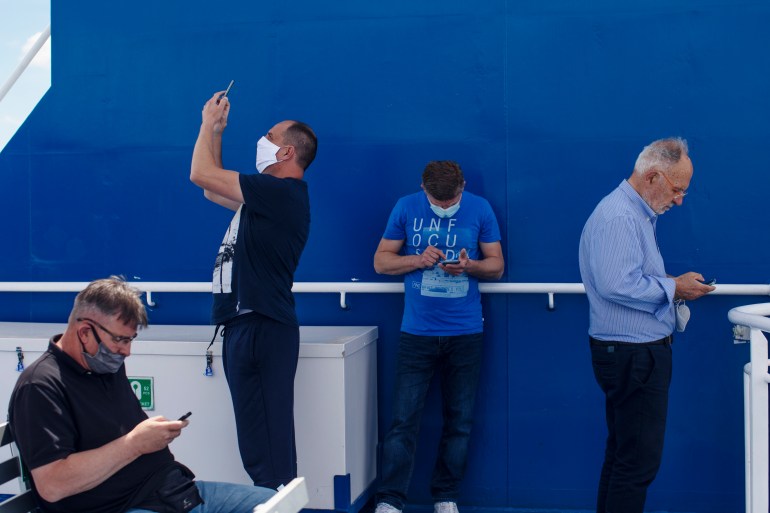
Sicily
Our last stop is a grave one: the makeshift camp in Cassibile.
Here, nothing much has changed during the crisis. People kept going to work on Sicilian tomato farms, even when the camp’s crackling TV reported increasing numbers of dead in Italy. Most of the refugees and migrants here had bigger problems to attend to. Then they realised that, with bureaucratic offices shut down because of the pandemic, their visa applications probably would not be processed this year either. Their dreams would be on hold – indefinitely.
“It’s not fair. Other people have been granted settlement in two years, while I’ve been waiting for eight,” says a Gambian man we meet late at night, sitting on a discarded sofa. He does not want to tell us his name.
I wonder whether this was the Europe the people here had imagined when they boarded dinghies to reach it. When I ask them, I get various versions of “no”. Their greatest fear is that their families back home will get to know that the promised land is a rubbish dump, that dad’s job infuses him with a pervasive smell that clings to his clothes, hair and skin.
Another Gambian man, who asks not to give his name, says that they are treated like animals because they are Black, and that a poor, white person would have been given shelter in his country, were the roles reversed. “But that’s the way of the jungle. You’ve got to be strong to survive,” he reflects.
Some of the men point out a spot where we can put up our tent. It is in the religious part of the camp, just beside the makeshift mosque.
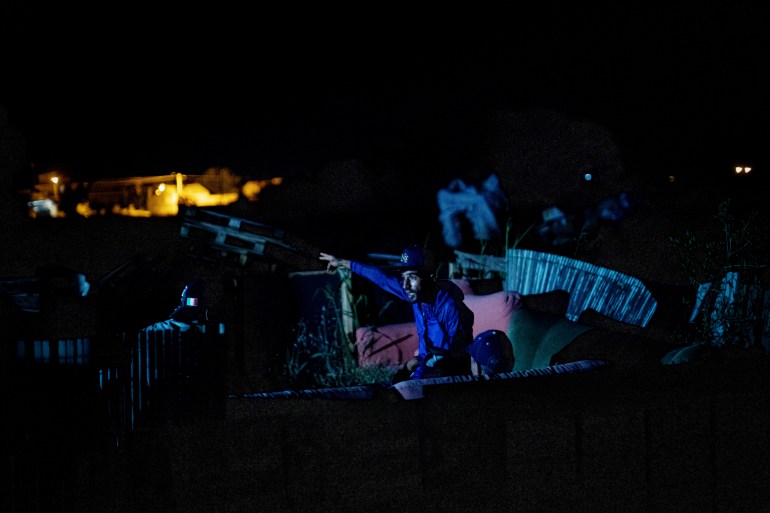
The Somali man who is planning to get married in Norway once he is able to return, asks if we are going to drive back to Oslo.
“Do you have a big car?” he inquires.
We tell him it is very small, because we know that if we put him in the back seat, we most likely will not make it back to Oslo. Border controls are strict, and we only have one press pass each.
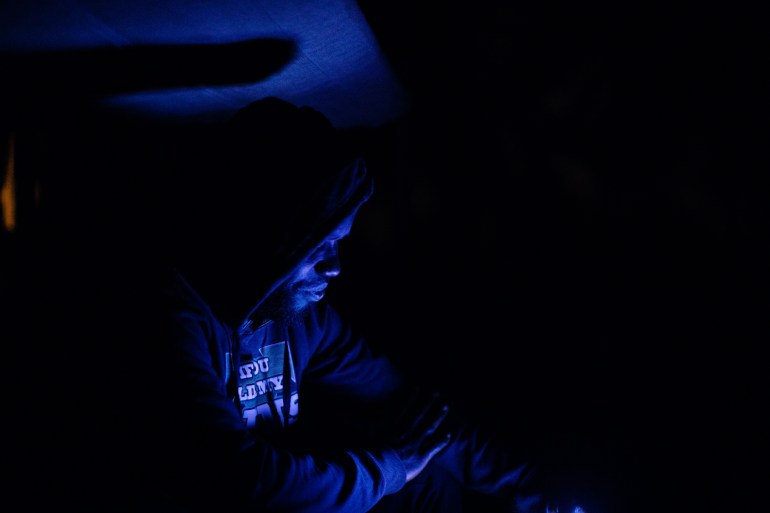
The next morning, we pack up our tent at sunrise. Kyrre wants to take pictures at dawn, before the camp rises. It is his only chance to get pictures of anything here, because the inhabitants do not want to have their photos taken.
An intoxicated man walks over to us. “Why are you taking pictures of us?” he asks. “People are sleeping. People want to be left alone. Go. Go. Go.”
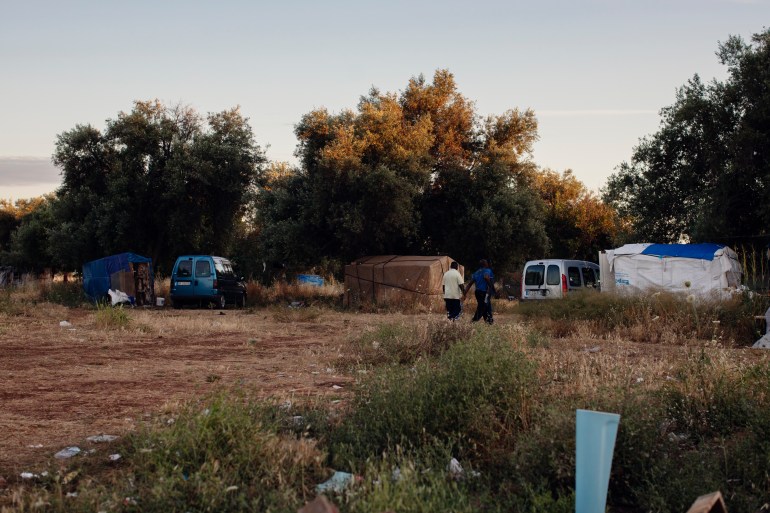
We leave and drive to the southernmost part of Sicily. There are no people in the streets, only the two of us. The sun is low and the ocean quiet. Is this it, I wonder. I feel no sense of a community, of us being together in something bigger. I just feel emptiness.
“Let’s go home,” I tell Kyrre.
He puts “Oslo” into the GPS, and turns the car around.
